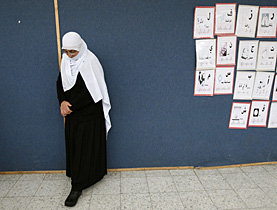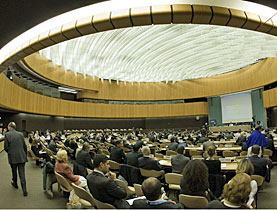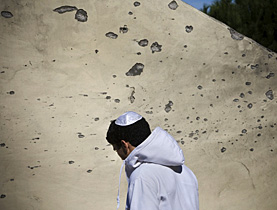Israeli coalition could “promote peace”

As Israeli political parties grapple with an inconclusive election outcome, a Geneva-based Middle East expert says a centre-right coalition could be the answer.
Pascal de Crousaz talks swissinfo through some of the coalition scenarios and their potential impact on the peace process.
In particular, a centre-right coalition between the Kadima, Labour and Likud parties would give them an overall majority and be the best way of continuing peace negotiations, he says.
Leaders of Kadima and Likud, the two main parties, are seeking coalition partners to form a government after neither succeeded in taking a commanding lead.
The centrist Kadima won 28 seats and the rightwing Likud opposition won 27 – far from the 61 needed to form a government.
The ultra-nationalist Yisrael Beiteinu of Avigdor Lieberman came third with 15 seats, but the Labour Party, regarded as more willing to pursue peace, fell hardest, landing in fourth place.
swissinfo: This election marks a historic defeat of the Labour Party. Will that benefit the moderate Kadima Party?
Pascal de Crousaz: This historic defeat has been heralded. But it was “not as bad” for the Labour Party as had been expected. And that, “thanks” to the war in the Gaza Strip, which enabled Labour’s warrior [Defence Minister] Ehud Barak to strengthen his credibility among the Israeli electorate.
The centrist Kadima party effectively benefits from this further decline of Labour. We are thus witnessing the shift of Israeli society from the centre to the right and the decline of traditional Labour voters – the middle class Ashkenazi [descendants of the mediaeval Jewish communities of western Germany] generations who are descended from Israel’s founding fathers.
swissinfo: The rise of the rightwing Likud Party has been hampered by the election results of the ultra-nationalist Yisrael Beiteinu Party. Is the political landscape more fragmented than ever?
P. de C.: Not that much. Some small groups that entered the scene during previous elections, such as the pensioners’ party or that of the cannabis smokers, have disappeared.
A large bloc is being formed that runs from left to centre-right. It consists of the Kadima Party [28 seats], Likud [27] and the Labour Party [13], a comfortable majority of 70 seats in the Israeli parliament.
It should be noted that Lieberman’s extreme-right party has gained in strength, but less than was expected. As for the other parties, they held their ground, whether it was the religious Shas [11 seats], the leftwing Meretz Party [3] or the Arab parties [11].
swissinfo: Does this new shift to the right put the Likud leader, Benjamin Netanyahu, in a position of power?
P. de C.: If the right and far-right form a coalition with their natural allies, it would obtain a large majority in the Knesset.
But it is also possible that it would want to project a presentable image, particularly with respect to the Obama administration that has announced its willingness to act vigorously and quickly for peace in the Middle East.
In order to do so, Netanyahu could try to form a centre-right coalition with Kadima and Labour, possibly without Lieberman’s party. This coalition would give it an overwhelming majority and enable it to call upon one another to deny the excessive demands of others.
From the perspective of the peace process, this would be the soundest solution for Israel. It would require Netanyahu to make concessions by accepting the creation of a Palestinian state. During the campaign he only talked about economic peace, the mere improvement of Palestinian living standards. But the exercise of power as part of a coalition could change all that.
Such a coalition should be created to extend beyond the strong rivalries of people around which Israeli policy often revolves.
swissinfo: On the Palestinian side, there is fear that the peace process will become paralysed.
P. de C.: It is clear that a bloc made up of the right and the extreme right, even with a Labour leader like Ehud Barak, would be light years away from the basic requirements for advancing the peace process.
swissinfo: In fact, it seems that nobody in Israel believes in peace anymore …
P. de C.: This last decade left the peace camp scarred by the second intifada, suicide attacks and insecurity in the south of the country after the evacuation of the Gaza Strip. Israeli citizens are questioning their country’s responsibility for this situation less than ever. Only the Palestinians are held responsible.
Israeli society is completely disillusioned. It has lost confidence in the peace process and fallen back on a nationalist and law and order position that depends almost completely on the army and the use of force.
However, if a credible peace plan is put forward, with firm guarantees of the security of Israel by the United States, the Israelis might reconsider their stance. In Israel, public opinion can change very quickly. Perhaps in the end people will no longer believe in military solutions alone.
swissinfo-interview: Frédéric Burnand in Geneva
The final results show that the centrist Kadima party won 28 seats (against 29 in the outgoing parliament), the Likud 27 (against 12), the right-wing Israel Beiteinou 15 (11), the Labor Party 13 (19) and the ultra-Orthodox party Shas 11 (12).
Normally, the party that wins the most votes is tapped to form the government.
After the publication of official results on February 18, President Shimon Peres, in consultation with all party leaders, has seven days to entrust the formation of a government to the party leader he believes is best placed to do the job.
Whoever is chosen then has 28 days to form a coalition, a period that may be extended by 14 days if necessary.
If the handover is unsuccessful, the president may appoint another party leader, who will then have just 28 days to form a government. If that again does not work, Peres can still turn to a third person. If this effort fails after 14 days, the president must call for new elections to be held within 90 days.
Likud leader Benjamin Netanyahu on Thursday met the leaders of religious right groups, who oppose all concessions with Palestinians.
A day earlier, Avigdor Lieberman, the head of the far-right Yisrael Beiteinu party, met Kadima Party Foreign Minister Tzipi Livni and Netanyahu, appearing to favour the latter though he deferred any decision. The conservative Shas also held its own talks with Likud.
Both Livni and Netanyahu have expressed interest in setting up broad-based governments. But neither has expressed enthusiasm for serving under the other.
The Palestinian Authority, which governs the occupied West Bank, said whoever ends up in charge in Israel is obliged to continue talks and to meet international obligations.
Livni led the main peace talks last year with the Palestinian Authority of President Mahmoud Abbas. Netanyahu is less convinced about the key trade-offs for an accord – ceding occupied land and curbing Jewish settlement. Lieberman and religious parties in a coalition would be likely to set virtually impossible conditions for a peace deal.

In compliance with the JTI standards
More: SWI swissinfo.ch certified by the Journalism Trust Initiative





You can find an overview of ongoing debates with our journalists here. Please join us!
If you want to start a conversation about a topic raised in this article or want to report factual errors, email us at english@swissinfo.ch.